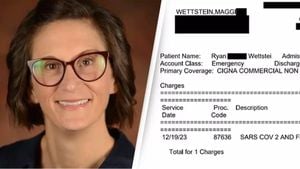Michael Sullivan, a Massachusetts man who spent nearly three decades behind bars for a murder he did not commit, received grim validation of his suffering earlier this month. Sullivan was exonerated after DNA evidence overturned his conviction for the 1986 murder and robbery of Wilfred McGrath. Yet even as the state jury declared him innocent and awarded him compensation, the cap set by Massachusetts law for wrongful convictions raised questions about whether it could ever suffice to heal the wounds left by years of wrongful imprisonment.
Convicted in 1987 based largely on circumstantial evidence and witness testimony, Sullivan maintained his innocence throughout his time behind bars. The prosecution's case hinged significantly on the notion of his blood being present on the purple jacket linked to the crime. Yet, advancements in forensic science led to DNA testing years later, which proved there was no blood on the jacket, prompting the re-evaluation of the case.
Despite his eventual exoneration, Sullivan's life was deeply marred by both the incarceration and the void it created. Over the course of his 27-year sentence, he endured physical assaults, emotional trauma, and the heartache of losing his mother and four siblings. "The money will never make up the years," said Sullivan, poignantly summarizing his reality. He remarked on the challenges of re-integrate back to society, saying, "It's difficult to navigate this world after so long away from it."
Upon his release from prison, Sullivan had hoped to reclaim some semblance of normalcy, but adjusting to life outside was more challenging than anticipated. He currently resides with his sister, trying to recover lost time and memory, but the years of incarceration left indelible scars on his psyche. His sister, Donna Faria, expressed deep concern for Sullivan's mental and emotional well-being. She described how the weight of their family's losses impacted him the most.
Several weeks ago, she shared the moment they learned about the compensation amount awarded to him after the landmark jury verdict. While the total monetary sum from the state was $13 million, Sullivan recognized the cruel twist of fate—the Massachusetts law limited compensation for wrongful convictions to only $1 million. "No amount of money could ever replace those lost years," Sullivan stated, underscoring the frustration not just with the justice system but also with the legal restrictions on compensation.
Many advocates for justice reform have since spoken out against the Massachusetts compensation cap, arguing it's outdated and fails to acknowledge the true extent of suffering endured by individuals like Sullivan. His attorney, Dana Curhan, underscored the importance of the DNA testing, calling it pivotal to Sullivan's case and reflecting the larger issues of wrongful convictions and the need for systemic changes. Curhan noted, "This case highlights the grave injustices possible within our legal framework."
Sullivan's story is not just personal; it is emblematic of the myriad pitfalls within the American justice system. Cases of wrongful convictions, spurred by unreliable testimonies or insufficient evidence, remain distressingly common. The conversations surrounding wrongful imprisonment and compensation echo louder than ever—reminding us of the human cost behind these legal failings.
The fact remains, the challenges do not vanish with exoneration. Sullivan now faces the task of rebuilding his identity and finding his place after decades of isolation. He expresses hope for his nieces and nephews, wishing to set aside some of the compensation for their futures, seeing it as his way of giving back, even as he grapples with the tangible losses suffered during his wrongful imprisonment.
Through the difficult transition, Michael Sullivan’s story continues to resonate with many, adding layers to the pressing dialogue on justice reform and the deep-seated issues facing the wrongfully accused. While his fight has led to personal vindication, it serves as a reminder of the urgent need for meaningful changes. Advocacy groups are pushing for more stringent protections against wrongful convictions, supporting systems for prisoners unjustly incarcerated, and calling for extensive reforms to compensation laws across the nation.
Michael Sullivan’s harrowing tale of wrongful conviction stands as both cautionary and inspiring, emphasizing the significance of enduring hope and the relentless pursuit of justice against overwhelming odds. The challenges surrounding his story, like those of many others wrongfully imprisoned, highlight the human stakes of our legal system, demanding public attention and legislative action. His life story is now interwoven with broader efforts to reform the system and support those who, like him, have suffered due to systemic failings.
Despite the monetary award and exoneration, Sullivan remains realistic about the remnants of his experience. His case acts as both a beacon for the necessity of reform and a reminder of the implicit dangers of a flawed justice system. For Sullivan, money may ease some burdens, but the true compensation must come through changes to prevent others from enduring similar fates—and securing justice for those who have been wrongfully accused.
Whether advocating for larger systemic reforms or simply sharing his story, Sullivan illuminates the path forward, artistically blending hope with urgency and generating awareness as he navigates the life post-incarceration. His future remains uncertain, but he is devoted to facing it with resilience, advocating for justice, and ensuring his story contributes to necessary changes within the legal framework.
Today, Michael Sullivan’s legacy continues as advocates rally behind his cause, pushing for the transformation needed to rectify the anguish caused by wrongful convictions. His narrative is not just about the past; it speaks of the need for justice reform now and the transformational power of resilience as he embarks on this new chapter of his life.



